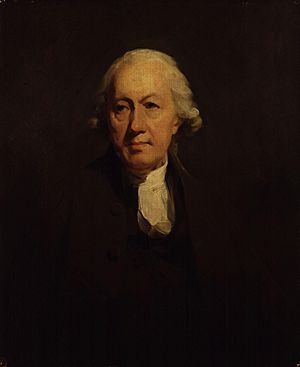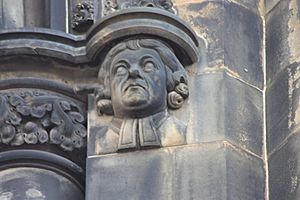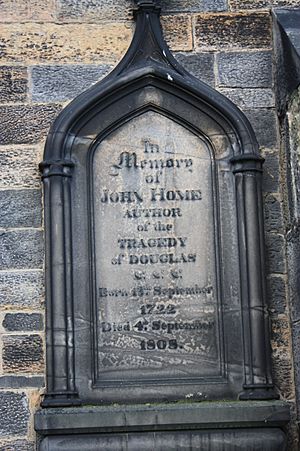John Home facts for kids
Quick facts for kids
John Home
FRSE
|
|
|---|---|

Portrait, oil on canvas, of John Home by Henry Raeburn, c. 1795–1800
|
|
| Born | 13 September 1722 Ancrum, Roxburghshire or Leith near Edinburgh, Scotland |
| Died | 4 September 1808 (aged 85) Merchiston Bank near Edinburgh, Scotland |
| Education | Leith Grammar School |
| Alma mater | University of Edinburgh |
| Genre | Playwright |
| Notable works | Douglas |

John Home (born September 13, 1722 – died September 4, 1808) was a Scottish writer, soldier, and a minister in the Church of Scotland. He is best known for his play Douglas. This play was a common school text in Scotland for many years. John Home also helped start the Royal Society of Edinburgh in 1783.
Contents
Early Life and Education
John Home was born on September 13, 1722, in Ancrum, Roxburghshire, Scotland. When he was very young, his family moved to Leith, which is close to Edinburgh. His father, Alexander Home, became a town clerk there.
John went to Leith Grammar School and then studied at the University of Edinburgh. He earned his master's degree in 1742. Even though he was interested in becoming a soldier, he chose to study to become a minister.
A Soldier and a Minister
In 1745, John Home became a licensed preacher. That same year, he joined as a volunteer soldier to fight against Bonnie Prince Charlie during a rebellion. He was captured at the Battle of Falkirk.
Home was held prisoner at Doune Castle in Perthshire. However, he managed to escape and made his way back home. In July 1746, he became the minister for the parish of Athelstaneford in East Lothian.
Friendships and Early Plays
While working as a minister, John Home often visited his friends in Edinburgh. He became very close with David Hume, who was a distant cousin. Other friends included famous thinkers like Adam Smith and William Robertson.
Home wrote his first play, Agis, in 1747. He took it to London, hoping it would be performed at the Drury Lane theatre. However, the famous actor and theatre manager David Garrick did not think it was suitable for the stage.
The Success of Douglas
The idea for his most famous play, Douglas, came to him after hearing a lady sing a traditional Scottish song called Gil Morrice. This song gave him the main idea for the story.
After five years, Home finished Douglas and again took it to London. David Garrick still rejected it. But when Home returned to Edinburgh, his friends decided the play should be performed there.
Douglas was first shown on December 14, 1756, and it was a huge success! This happened even though some church leaders were against it. John Home later resigned from his church position in 1757. Douglas was then performed in London at Covent Garden on March 14, 1757.
Many people loved Douglas. The philosopher David Hume praised it, saying Home had a "true theatric genius." However, not everyone agreed. The writer Samuel Johnson famously said there were "not ten good lines in the whole play."
Later Career and Writings
In 1758, John Home became the private secretary to Lord Bute, who was an important government official. Home also became a tutor to the Prince of Wales. In 1760, he received a yearly payment of £300, and in 1763, he got another £500 for a special position.
His play Agis was finally performed in London in 1758, but it was not as good as Douglas. He wrote other plays, including The Siege of Aquileia (1760), The Fatal Discovery (1769), and Alonzo (1773), which had some success. However, his last play, Alfred (1778), was not well-received, and he stopped writing for the stage.
John Home was also active in Edinburgh's social life. He joined a group called the Poker Club in 1762. In 1763, he became a Member of Parliament for Edinburgh.
In 1778, he joined a military regiment. He had a bad fall from a horse, which affected his health. His friends convinced him to retire. From 1767, he lived either in Edinburgh or at a house he built near his old church. During this time, he wrote his History of the Rebellion of 1745, which was published in 1802.
John Home passed away on September 4, 1808, at Merchiston Bank, near Edinburgh. He was buried in South Leith Parish Church.

Legacy and Memorials
John Home's works were collected and published in 1822. His play Douglas is still included in many collections of British plays.
You can find John Home among the sixteen writers and poets shown on the Scott Monument in Edinburgh. There is also a small bronze plaque near where his home used to be on Maritime Street in Leith.
 | Jackie Robinson |
 | Jack Johnson |
 | Althea Gibson |
 | Arthur Ashe |
 | Muhammad Ali |

